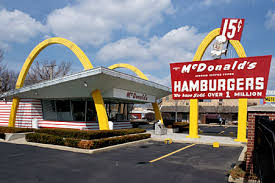Eucharistic Faith and Love
(Proverbs 9:1-6; Psalm 34; Ephesians 5:15-20; John 6:51-58)
********************************************************
Do you have an unwise, fast food attitude towards your faith?
Be wise: develop a deep, Eucharistic faith and live it out in love.
The first reading today speaks of wisdom, and the lack of it as immaturity. This focus on wisdom provides a context for today’s gospel about Jesus as the Bread of Life.
The 60’s and 70’s was an era that saw the development of the fast food phenomenon. Potato chips, hamburgers ready to go, micro-wave popcorn, TV dinners, drive-through restaurants – everything became quick, easy and even tasted good. The convenience seemed to outweigh the loss of nutrients and health value. But how wise is a choice to consistently eat fast foods?

Recently, there has been a reaction, called “slow foods.” Articles about this new phenomenon are starting to appear in newspapers and magazines. The idea is to make healthier choices that feature choosing higher quality foods, taking more time to prepare them and especially, taking more time to gather socially and have meal times together. This seems to me to be the wisest choice.

Banquet after my first mass in Delmas, SK 1974
Is it possible that as a population, we lack wisdom and are suffering from a “fast foods faith phenomenon”? Consider these symptoms: People today want a variety of spiritual experiences that tide them over, but do not sustain them for any length of time. I think it is true to say some are seeking religious and spiritual experiences, such as visions and apparitions, to medicate the pain of their daily lives instead of dealing with their issues directly. In their prayer lives, some are talking to God and making a lot of demands, hoping God will do their will and do it promptly. Could there be some lack of wisdom here?
What then would a wiser “slow foods faith spirituality” be like? Our prayer would be more contemplative, with more time spent reading, pondering and listening to God’s word, seeking only what is God’s will for us. We would have greater self-awareness in our lives and less denial. We would take time to feel our feelings and share them with others, meditate on spiritual truths, name our defects of character and our sins and deal with them, and also acknowledge our personal qualities. We would not be afraid of the inner journey to our true selves.

We would be more at home with the process of inner change, repentance and metanoia. Along with a greater intimacy with God we would have more intimate relationships with others, perhaps a soul mate, someone who would know us through and through. We would find ourselves making a deeper commitment to a faith community of caring and worship. In the words of the second reading, we would make music to the Lord in our hearts, be filled with the Spirit, and give thanks to God the Father at all times in the name of Jesus.
The gospel suggests above all, a wise slow food spirituality would lead us into a deeper appreciation of the Eucharist and living it out in love.
Jesus presents us with some choices for those who are wise: to believe that he is God, the Bread of Life come down from heaven, and then to eat his Body and drink his blood.
We are first asked to believe. Jesus identifies himself as the living bread from heaven that gives eternal life and leads to him indwelling in us. Wisdom and faith tell us Jesus is present in the Eucharist in three special ways: in each person who participates, in the proclamation of the Word (he is after all the Word of God made flesh), and of course in the consecrated Bread and Wine.
Next, he asks us to eat his Body and Blood. This means more than just receiving communion. The choice of words Jesus uses when he claims “unless we eat his flesh and drink his blood we will not have life within us,” are significant. He does not use the Greek word “soma” which means the body beautiful, in its youthful prime. Rather, he uses the word “sarx” which refers to the body that ages, gets wrinkled, weak and sickly.
To eat this “sarx”, this flesh of his, means to love those we do not like, to accept others as they are, to love our enemies, to care for those who try our patience. It was this unpleasant reality that turned people away from him – that still today can deter those who seek an easier, softer way, who lack the wisdom to see beyond the superficial.
In short, to eat and drink the flesh and blood of Jesus, is not only to find him prayerfully in the Blessed Sacrament, but above all to meet him in one another, especially in those whom we find hard to love, whose particular personalities or needs challenge us. This is the acid test for the Christian – one the Holy Spirit alone can truly empower us to meet.
The founder of the Missionary Oblates of Mary Immaculate, Saint Eugene de Mazenod, was a wise man who understood this mystery of the Eucharist. It was his profound grasp of this mystery that drove him as a bishop to reach out to the poor, the dispossessed, the marginalized, the fishermen and women at the docks of Marseille. It was this love for the poor that led him to overcome class distinction and speak Provençal, the language of the people, the “patois” of that time. It was his Spirit-filled love for all people that empowered him to found a world-wide missionary Order reaching out to evangelize everyone. It was his faith in the Real Presence that enabled him to be bonded with his missionaries before the Blessed Sacrament. His was truly a Eucharistic love, a Eucharistic faith. May he be an example for us in our own day.

St Eugene at Marseille
The Eucharist is not just pious worship of Jesus in the sacred bread and wine, but even more so a commitment to recognize him and serve him in our brothers and sisters in need.
So let us be wise – develop a profound, “slow food Eucharistic faith” and live it out in love.




The Body and Blood of Christ is Jesus. Once we receive it in slow motion and loving it like eating food at Fast Food restaurant. We suppose to receive the communion like enjoying food and a meal at home and at this restaurant. We are to do in slow motion and let it melt in our mouth while we are praying until we are done praying to God. The Eucharist is Jesus Christ when he transform the bread and wine to his own flesh and blood. Well yes, we are to recognize him and serve him by spreading the Good News and live out his teachings like his 12 disciples. When we believe in him by receiving the communion he will help us with any problems and forgive us from our sins. He will answer our prayers and find ways to help us . He is with us when we receive the Eucharist during the celebrations. It is up to us whether we recognize the only or same Jesus Christ. This comes from the heart to love people and to love one another. We are to show this love through Jesus Christ with slow food Eucharist. Many Blessings! Blessings !
Thanks for the inspiring and wonderful homily that we will keep in our minds. The Eucharist should be receiving with full faith and love that comes from our hearts. You should be blessed for these outstanding homilies, keep it up ! Thanks for sharing the pictures Bishop Lavoie .